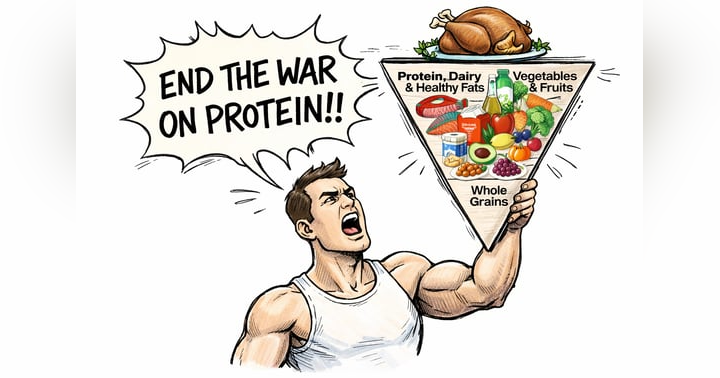Deficiency Detective: 34 yr Old Healthy Female with NAFLD
Clinical Vignette:
Meet Sarah, a 34-year-old vegetarian who has been following a plant-based diet for the past five years. She’s active and generally healthy, but recently, she’s noticed some concerning symptoms.
Sarah’s doctor diagnosed her with non-alcoholic fatty liver disease (NAFLD) after an ultrasound showed excess fat in her liver. She also feels more fatigued and anxious than usual and has started experiencing mild muscle weakness. She hasn’t consumed alcohol, and her doctor ruled out other common causes of liver damage. She is 12 weeks pregnant. Despite eating what she believes is a balanced vegetarian diet, these symptoms have started to worry her.
Which nutrient might Sarah be deficient in?
Hint: This nutrient is crucial for synthesizing and releasing lipids from the liver into blood circulation.
Answer: Choline!
Choline is an important nutrient that often flies under the radar, but it plays a crucial role in many bodily functions, including brain health, liver function, and muscle movement. It's also vital for cell membrane structure and DNA synthesis. Despite its importance, many people—especially those following plant-based diets—may not be getting enough choline in their daily intake.
What is Choline?
Choline is a vital nutrient that the body needs but can only produce in small amounts. While the liver makes a bit of choline, it’s not enough to meet daily requirements, so it’s crucial to get it from food or supplements. Once inside the body, choline is converted into acetylcholine, a neurotransmitter that plays an essential role in muscle function, pain response, memory, and cognitive thinking. In the liver, choline is used to produce phosphatidylcholine, which helps break down cholesterol and build fat-transporting proteins. One of choline’s most important roles is aiding the liver in metabolizing fats. It helps transport lipids from the liver into the bloodstream, preventing the accumulation of fat in the liver.
Beyond fat metabolism, choline is indispensable for brain health. The American Academy of Pediatrics has identified it as a critical nutrient for brain growth and neurodevelopment, especially during infancy. Choline also supports memory function and nerve signaling, making it a key player in cognitive health throughout life.
Symptoms of Choline Deficiency
Choline deficiency can lead to several serious health conditions, with non-alcoholic fatty liver disease (NAFLD) being one of the most common. NAFLD occurs when fat accumulates in the liver due to the body's inability to synthesize and transport lipids properly. This condition can progress to more severe liver issues, such as non-alcoholic steatohepatitis (NASH), liver damage, or even end-stage liver disease.
Other symptoms of choline deficiency include:
- Muscle damage
- DNA damage
- Cognitive impairment
- Fatigue or weakness
Risk Factors for Deficiency
Frank choline deficiency is rare in healthy, non-pregnant individuals, but certain groups are at a higher risk. Postmenopausal women, for example, are more susceptible because their bodies produce less estrogen, a hormone linked to choline synthesis. Vegans and vegetarians also face a higher risk of deficiency, as choline is primarily found in animal products like eggs and meat. Research shows that plant-based sources of choline provide only a small fraction of the daily requirement, making it challenging for these groups to meet their needs.
Pregnant women are another group at risk for choline deficiency, as their requirements for this nutrient increase significantly. Despite this, most prenatal supplements contain little to no choline, leaving a potential gap in nutrition during a crucial period of fetal development.
Additionally, individuals receiving long-term total parenteral nutrition (TPN) may be at risk, as choline is not routinely added to commercial parenteral solutions for infants or adults. The American Society for Parenteral and Enteral Nutrition (ASPEN) recommends the routine inclusion of choline in both adult and pediatric TPN formulations and advocates for the development of a commercially available product that contains choline.
Choline and Plant-Based Diets
For those following a plant-based diet, it’s essential to pay close attention to choline intake. While choline can be found in some plant foods, the amounts are significantly lower than in animal products. For example, a whole egg contains 230-270 mg of choline, while a cup of soybeans contains about 120 mg, and broccoli contains only 40 mg per serving.
Given that the recommended daily intake of choline for adults is 550 mg for men and 425 mg for women (and 550 mg for breastfeeding women), plant-based eaters must be intentional about incorporating choline-rich plant foods like soybeans, quinoa, and brussels sprouts into their diets. Supplementation may also be considered, particularly during critical periods such as pregnancy or lactation.
Did You Know?
Lecithin, a common food additive found in items like salad dressings, gravies, and ice cream, is a good source of choline, containing 3-4% choline by weight. Some choline supplements are derived from lecithin, making it an option for those needing to boost their intake.
Recommendations for Healthcare Providers
For healthcare providers counseling patients on plant-based diets, here are a few key points:
- Recognize risk groups: Vegans, vegetarians, pregnant/lactating, and postmenopausal women are more prone to choline deficiency.
- Encourage a varied diet: Remind patients to include choline-rich plant foods, such as soy products, legumes, and whole grains, in their daily meals.
- Consider supplementation: In certain cases, such as during pregnancy, lactation, or when dietary intake is insufficient, recommend choline supplements. However, be cautious with adult and elderly patients, as some studies suggest that high doses of choline supplements could have a prothrombotic effect.
By paying attention to choline intake and helping patients understand its importance, healthcare providers can guide their patients—especially those on plant-based diets—toward better health outcomes.
For further reading:
- https://ods.od.nih.gov/factsheets/Choline-HealthProfessional/
- https://link.springer.com/article/10.1007/s00394-016-1296-8
- https://aspenjournals.onlinelibrary.wiley.com/doi/full/10.1177/0884533612446706#





